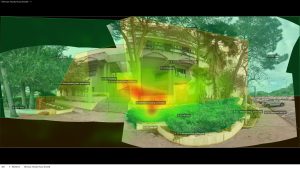Nature’s Soothing Power
Technion Study Finds Viewing Nature Eases Mental Stress
A Technion study reveals that observing natural elements during daily actions such as walking to and from work improves mood and reduces stress and anxiety, according to participants’ reports. The research was led by Dr. Whitney Fleming, a postdoctoral researcher in Prof. Assaf Shwartz’s research group. Prof. Shwartz is a socioecologist and head of the Landscape Architecture Department in the Faculty of Architecture and Town Planning at the Technion.
The study used eye-tracking technology to examine the benefits of daily interactions with nature. As part of the study, Technion students were asked to take a walk around campus, simulating a regular walk to or from work or studies. The students were divided into three groups. The first group was asked to observe nature during the walk and stopped ten times at “green” points with natural elements. The second group was also asked to stop ten times, but at “gray” points with built, artificial elements such as buildings, roads, and cars. The third group combined both, observing both natural and artificial elements.

Examples stopping points for different groups. The “spots” indicate the places where participants are looking.
Individuals who directed their gaze more frequently at green elements reported a decrease in stress and anxiety after the walk, compared to measurements taken before the walk. This reduction was not recorded in the other groups. Researchers tracked the participants’ eye movements and found a correlation between the duration of viewing natural elements such as trees, bushes, and lawns, and improvements in mental health indicators. The most beneficial impact was observed from viewing trees.
Prof. Shwartz stated: “We are in a very stressful period with complex mental challenges, and nature can play a central role in our ability to cope. By using cutting-edge eye tracking technology, our research shows that simply being mindful of nature, even during a regular walk to or from work or studies, can be beneficial to mental health and help relieve stress. Previous studies have shown that interaction with nature has benefits for mental health and quality of life, but this study demonstrates for the first time that even a few fleeting glances at nature during daily routines can yield these benefits.” Prof. Shwartz added, “Our research shows how important it is to incorporate natural elements in urban planning. However, this integration is not enough, landscape architects and planners should also think about innovative means to enhance the experience of this nature and ensure that residents actually notice these elements. The challenge is to design our cities in a way that encourages interaction between people and nature. Such interactions will improve both the residents’ quality of life and their connection to nature, and desire to preserve it.”
The study was supported by a European Union ERC Starting Grant and the Zuckerman STEM Leadership Program.
Read the full paper here: The nature gaze: Eye‐tracking experiment reveals well‐being benefits derived from directing visual attention towards elements of nature – Fleming – People and Nature – Wiley Online Library




